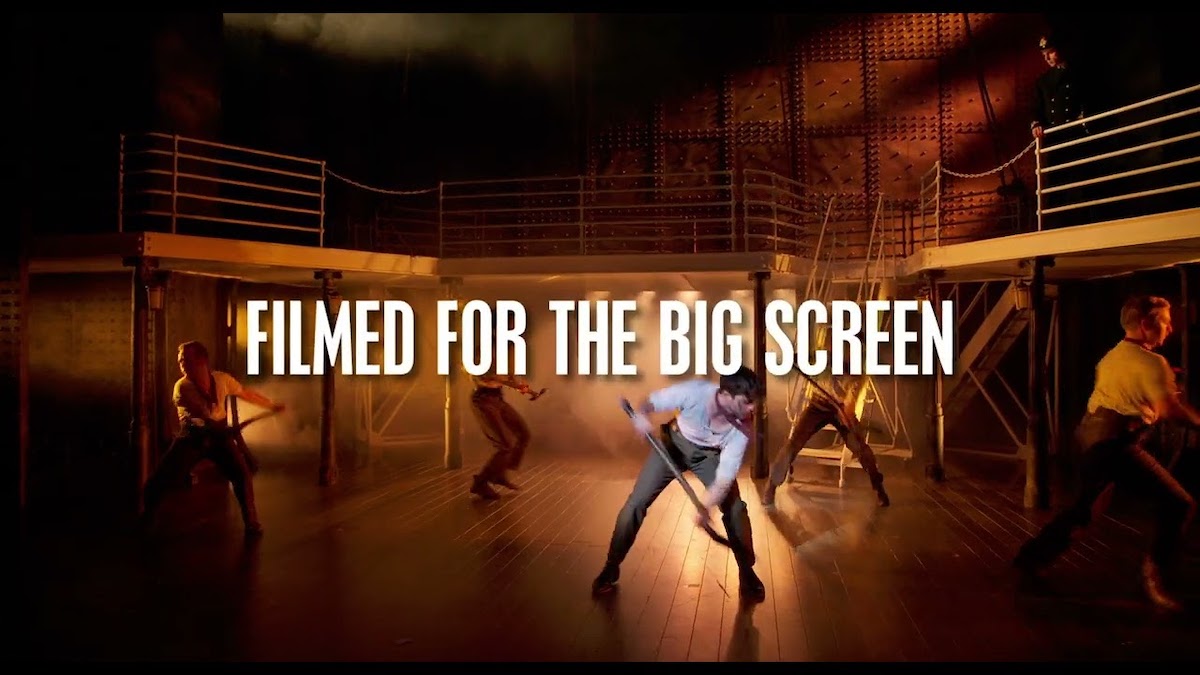‘Titanic: The Musical’ Is My Eras Tour

If Taylor Swift and Beyonce’s concert films put you in the mood for more nontraditional moviegoing experiences, or want to get in on the fun in your own way, I have an alternatively toe-tapping and emotional recommendation. A filmed production of Titanic: The Musical, one of my personal favorites, is playing in theaters across the United States on November 4 and November 8 thanks to Fathom Events.
First, let’s address the iceberg in the room: Titanic: The Musical is not an adaptation of James Cameron’s film. Jack and Rose ain’t in it. The musical Titanic opened on Broadway in April of 1997. That’s eight months before Kate and Leo melted hearts on celluloid. It ran until 1999. The original cast included Brian D’Arcy James, Michael Cerveris, Victoria Clark, and Becky Ann Baker. It won five Tony Awards. The reason it didn’t permeate the zeitgeist, in my humble opinion, is because the movie took up a lot of space in pop culture. But it was successful! And if you want to see a musical featuring Jack and Rose, check out Titanique in New York City. It’s a scream.
Titanic the Musical is having a comeback, 25+ years later, due to an upcoming off-Broadway revival and this incredible filmed production directed by Thom Southerland. According to the Fathom Events page for the theatrical event:
“The first performance of this UK production was at Southwark Playhouse in July 2013. It subsequently played in Toronto and on two major UK and international tours. This production is about to return to China for a five-city tour, one of the first Western companies to head to China post-pandemic.”
Maury Yeston’s score is big and sweeping in a way that only pre-contemporary musicals tend to be. Think Les Miserables, Jekyll and Hyde, Children of Eden, Ragtime, and The Secret Garden. The harmonies alone in some of Titanic‘s bigger choral numbers make me weep. Seeing it in theaters is worth it for the sonic experience alone. The staging is intimate, for a ship so big, and almost claustrophobic in a way that adds tension. There is a looming disaster, after all.
Since we’re all friends here, I have to say that one of my biggest impressions watching this is that American actors really are much worse at Irish accents than I thought. There’s a song called “Lady’s Maid” about the hopes and dreams that America holds for the Third Class passengers. When you grow up listening to singers who hit those “oy” vowels a bit too hard on the Broadway cast album, then watch this, the second-hand embarrassment is rough. Granted, there are a handful of awkward American accent moments in this production that help balance the scale. It’s just nice to hear a more authentic version of some of the songs. And if I may offer one criticism: I’m sad that this production cut the other languages that appear in the original version of the song and highlight the diversity below decks.
The musical does not center on any one character’s fate but rather an ensemble of crew members and passengers. Many of them are based on real people, including the junior wireless operator Harold Bride. Another, a stoker called Frederick Barrett, is based on two real crew members who had the same name. Only one “Frederick Barrett” survived. Isn’t that interesting? If you love research, looking up the true stories of the people who inspired Titanic: The Musical‘s characters is excellent fodder. I know that there are plenty of us out there for whom the Titanic was our “Roman Empire,” a.k.a. a historical event we obsess over.
In fact, one of the opening songs compares the technological achievement of Titanic to great works of human achievement like “the aqueducts of Rome.” “No, not a pyramid,” one lyric repeats… ironic because Titanic did, after all, become a tomb. What really strikes me upon revisiting the play is this theme. Titanic: The Musical highlights “progress” as a value of the early twentieth century. There was a time when the rich and powerful actually wanted to go forward, rather than back. It’s weirdly nice to see the first-class passengers chat excitedly about new inventions instead of longing for the good old days.
In Titanic: The Musical‘s haunting duet, “The Proposal/The Night Was Alive,” Harold Bride shares what the telegraph means to him Barrett the stoker. He sings about how the dits and dahs allowed an introvert like him to connect with people around the world. The song is beautifully executed in this production. It’s a rare bond between two crew members who shouldn’t meet.
Of course, I’m not idolizing 1912, when America was in the “nadir of race relations” and women could not vote. (And that’s just two examples.) Plus, greed was a major factor in the Titanic’s ultimate failure. If it weren’t for the desire to please the first-class passengers, Titanic would have had more lifeboats. The ship wouldn’t have been traveling so fast on the night she sunk. And sure, the upper crust of the Gilded Age were as obsessed with monopoly as they were with innovation.
But that’s all part of the tragedy. For all the hope and progress that Titanic represented, she flew too close to the sun. It’s poetic and sad—the perfect subject for a musical. Check it out if you get the chance! If you dance in the aisles, a la Eras, it might be a little weird, but I won’t tell on you.
(featured image: Fathom Events)
Have a tip we should know? tips@themarysue.com